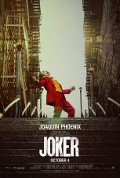
Directed by
Todd Phillips
120 minutes
Rated MA
Reviewed by
Bernard Hemingway


Joker
Anyone who goes to Joker expecting more of the psychotically nihilistic antics of Jack Nicholson or Heath Ledger’s Joker will be disappointed by Joaquin Phoenix’s humanistic incarnation of Batman’s would-be nemesis. Not that Joker is not nihilistic but because it is, grimly, unrelievedly, more so. Directed and co-written with Scott Silver by Todd Phillips whose C.V. to date has been confined to multiplex comedies, the best known of which are the dire Hangover movies, rather than giving us the thrills and spills of cartoon heroes and villain Joker is a disturbing portrait of a tormented outcast in a broken society that for all its dourness, feels only a garbage strike away from the one we live in.Although the story does abut the Batman prehistory, of the caped crusader there is not a sign and Joker, the alter ego of would-be stand-up comedian Arthur Fleck, only makes his appearance briefly towards the end of the film. For most of the film’s lengthy run-time we are in the company of Arthur, a heavily medicated, former psychiatric in-patient who is, not very successfully, scraping a living as a clown-for-hire and living in a run-down apartment block with his invalid mother (Frances Conroy) with whom every night he watches late night TV host Murray Franklin (Robert De Niro) and dreams about being a guest on the show.
On a daily basis he is beaten by young louts, mocked by his fellow employees, bullied by his boss and the public out-patient service he attends closes down after funding cuts. Still, he looks after his mother and meekly tries to do his best. But one night on the subway, still in his costume, the worm turns when he shoots and kills three white collar oafs harassing a young woman. For the hoi polloi of the hurting world of Gotham City his act becomes emblematic of self-empowerment. Tagged by the media as “The Clown Killer”, Joker is born, a moniker Arthur has taken from Murray’s disparaging reference to his stand-up comedy act.
If the script is finely crafted and the production values top drawer what carries the day, almost needless to say, is Joaquin Phoenix’s remarkable (and Oscar-winning) performance. Phoenix and Phillips's focus is not on Joker’s villainy but rather on his damaged psychology. Whilst the real, shocking basis for this is revealed late in the film Phoenix, who has ravaged his physique as an analogue to Arthur’s damaged soul, embodies the pain and alienation that has been Arthur’s lot in life in a performance of sustained intensity. Its palpable empathy brings home the awareness that as much as Joker’s killings are unconscionable so has been his life-long mental suffering.
There are aspects that don’t entirely work. Arthur is, for a time, given a romantic interest in the form of an improbably attractive single mother (Zazie Beetz) living in the same apartment building. Particularly given their outcome these scenes could have all been omitted. A scene in which Arthur climbs into a fridge locking himself inside, is oddly truncated with no narrative consequence whilst the ironic use of pop songs is overdone, in particular Jimmy Durante’s ‘Smile’ and Frank Sinatra’s ‘That’s Life’. One airing would have been Dennis Potterishly witty, two is heavy-handed. The film's ending is also rather odd. The effective ending, one would have thought, would have been the film's penultimate scene of the street riot, not the oblique and perversely comical one that we actually get.
For all that, Joker is a film not to be missed.
Want something different?





